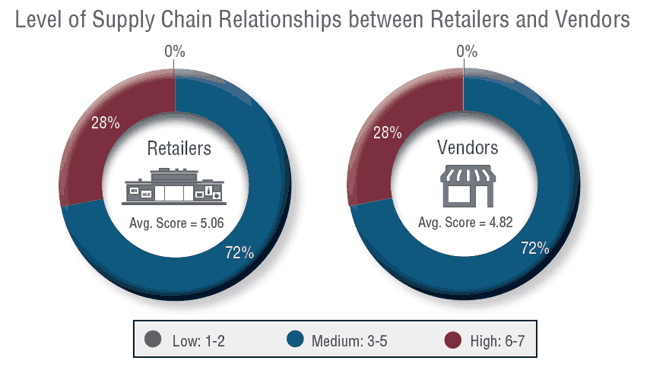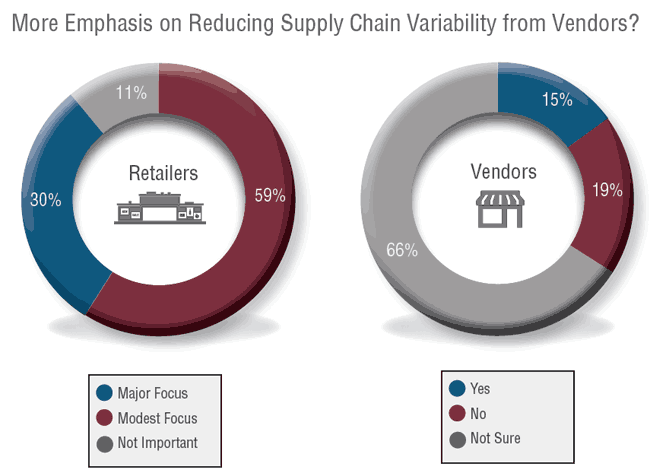We’re back for one last time with highlights from our second biannual benchmarking study on the state of retail and vendor relationships and collaboration, based on survey responses from retailers and vendors.
The good news is both sides say that their relationships are getting slightly better – or at least not deteriorating. We asking both retailers and vendors to rate their current relations with vendors or retailers from a supply chain perspective on a scale of 1 to 7, with 1 being the worst and 7 being the highest. We then took those scores and grouped them, in an approach we use throughout this report: 1-2 categorized as low, 3 to 5 medium, and 6 or 7 high.
Supply Chain Digest Says... |
 |
A significant 30% or retailers say reducing vendor-caused supply chain variability is a major focus area, with another 59% saying it is at least a modest focus.
|
 |
|
|
As can be seen in the chart below, the results were almost identical, with 72% of both retailers and vendors indicating they had medium levels of supply chain relationships, and 28% claiming high levels, while no retailer or vendor said they had poor supply chain relationships.
The average score for retailers was 5.06, a bit above the 2016 benchmark average of 4.72, while the average vendor score was of 4.82 was almost identical to the average of 4.85 in the prior survey.
"On-time, in-full continues to be challenging," one vendor commented. "Not all retailers apply same metrics."

"Good relations but not great compliance," interestingly said one retailer. Added another: "Would say things are fairly status quo, which means OK but not great in this time of immense change."
You can certainly say that again.
Visit the Retail Vendor Performance Management home page to learn more
and subscribe to the monthly newsletter.
Importantly, over the last 18 months or so, Walmart and Target both have announced programs to reduce vendor variability, an area where frankly most retailers historically have put little real focus, other than collecting chargebacks. Grocers HEB and Kroger have also launched similar initiatives, in a first for the grocery sector.
Is this a real overall trend in the consumer goods to retail supply chain? An emerging one, our survey data says. A significant 30% or retailers say reducing vendor-caused supply chain variability is a major focus area, with another 59% saying it is at least a modest focus.

On the vendor side, 15% see variability as a major retail focus, though the vast majority (66%) say they aren't sure yet.
The comment from one vendor probably has it right: "With Walmart - absolutely. If they are successful, others will follow."
The excellent full report can be found here: The State of Retailer-Vendor Supply Chain Relationships 2018
Any comment on this article? Enter below.
Your Comments/Feedback
|